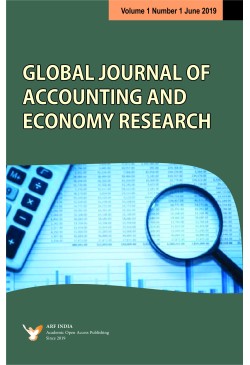
Global Journal of Accounting and Economy Research
Frequency :Bi-Annual
ISSN :2319-443X
Peer Reviewed Journal
The objective of the paper is to investigate the nexus between public expenditure and poverty in Nigeria. The ARDL approach to error correction mechanism is employed for analysis of data spanning 1981–2019 periods. The study used per capital consumption as aproxy for poverty while government expenditure was dis aggregated into capital and recurrent for the purpose of robustness. The empirical evidence indicates that recurrent government expenditure affects poverty in the short-run while weak evidence was founding the long-run. Government capital expenditure and FDI were observed to be weak determinants of poverty as revealed by the short and long-run estimates. The study further found that real-GDP affects poverty significantly in the short-run while weak evidence was established in the long-run. Stability and reliability of the ECM model was tested using CUSUM and CUSUM-Squares plots. Based on the findings, the study recommends for policy consideration, the need for government to focus more expenditure not only on recurrent expenditure but also on public expenditure on infrastructure, sound education, quality healthcare, good transportation system and conducive environment capable of stimulating growth and thereby translating to poverty reduction.
Keywords: Government expenditure, Poverty, Unit root tests, ARDL model, Stability test,
JEL Code: C22, C32, H52, H76, P3
Nigeria has experienced several periods of high debt, inflation as well as currency fluctuations with comparatively high interest rate. These factors have culminated into increasing price of goods and services which necessitated this study to examine the impact of household consumption expenditure on the price level between 1970 and 2019 using annual time series data in an Auto regressive Distributed Lag Model (ARDL)and other accompanied econometrics tests. The result shows household consumption expenditure in Nigeria to be deficient just as excessive negative effects of interest rate and exchange rate on the price level was noticed. On that note, the Nigeria government was urged to spur increase in the level of productivity in the country via massive investment in agriculture and also the need for the government to increase the tariffs for goods that can be locally manufactured in the country as a means of encouraging local production at affordable prices for Nigerian consumers was admonished.
Keywords: Analysis, Effects, Household Consumption Pattern, Inflation, Nigeria.
JEL Classification: D1, D11 & D13
The paper reviewed extant literature on the management challenges of public enterprises in Nigeria. The main idea behind this work is to understand the causes of these challenge sand problems in the public enterprises in the country Nigeria. The paper identified several factors that have constituted huge challenges in the management of public enterprises in Nigeria. And the ways out of these challenges can only be through transparency,commitment and honesty. And for these to be achieved, there are things or certain habit we need to avoid, including corruption, nepotism and favoritism. The paper conclude don the note that, Nigeria can only experience good development when its public enterprises become viable and economically useful.
Keyword: Value system, corruption, transparency and honesty.
he nexus between portfolio re balancing and returns of equity investments listed at the Nairobi Securities Exchange is examined in this study. The study used longitudinal research design. The target population was all equity investments listed at the Nairobi Boer.Secondary data which included equity investments daily returns and annual reports for the period 2014 to 2019 was used to calculate the standard deviation, compound annual growth rate using the geometric average rate of return and risk reward (Sharpe ratio)associated with equity investments. Over the study period, the finding was that the terminal portfolio balance at the end of December 2019 was $45.65 million for 20% daily re balancing. The cumulative growth (geometric mean) was 7.67% annually. Daily, quarterly,and annually re balancing strategies outperform the 2nd and 3rd - yearly re balancing and buy-and-hold strategies for all re balancing bands. When asset allocation of 60% stock/40% bonds is considered, daily re balancing strategy at 10% re balancing band recorded the highest standard deviation (10.54%) while the lowest standard deviation was recorded on 3rd-Yearly re balancing strategy (9.96%) at 15% re balancing band. When asset allocation of 40% stock/60% bonds is considered, the study found out that daily re balancing strategy at 10% re balancing band recorded the highest standard deviation of 8.27 while annual re balancing strategy with a 15% re balancing band recorded the lowest standard deviation of 7.72%. The study concluded that time and threshold re balancing strategies have an effect on the return of equity investments listed at the Nairobi Securities Exchange. The study recommended that equity investors should consider both time and thr esholdre balancing strategies when selecting portfolio re balancing strategies that have an effect on portfolio return.
Key Words: Portfolio re balancing, returns, re balancing bands, equity investments.
This study examined the impact of electronic banking on the performance of deposit money banks in Nigeria. The specific objective were; to examine the impact of ATM,POS, Internet and Mobile banking on the performance of deposit money banks, using return on equity (ROE) as a proxy. Data were sourced from secondary through CBN Financial Report, 2019. Descriptive statistics and correlation matrix were adopted in this study. The study revealed that ATM had a positive effect on the performance of deposit money banks, POS had no effect on the performance of deposit money banks and mobile banking also have a positive effect on the performance of deposit money banks.It is therefore recommended that regulatory authorities should enforce new standard sand policy on the charges of electronic transaction and should be able to provide adequate security both physically and electronically to check the incidence of hacking fraudsters.Also recommended that mobile banking and internet services should be made accessible and easier to use in order to improve it popularity.
Keywords: Electronic banking, ATM, POS, Internet and Mobile banking, Return onequity (ROE).